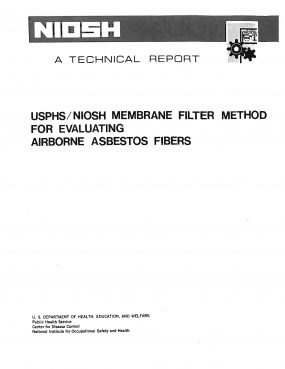USPHS/NIOSH Membrane Filter Method for Evaluating Airborne Asbestos Fibers
January 1979
DHHS (NIOSH) Publication Number 79-127

Evaluation of airborne asbestos (1332214) fibers by the membrane filter method (NIOSH Analytical Method Number P/CAM 239) is described. The purpose of the method is to determine worker exposure to airborne asbestos fibers as referenced in the Federal standard on occupational exposure to asbestos and the Mine Safety and Health Administration air quality standards. The complete analytical method and the OSHA standard are reproduced in the appendix. Sources of variation in the monitoring procedure include those due to: the portion of the filter examined; differences among counting technicians; differences in sampling pump flow rates; differences in laboratory personnel and equipment; and concentration changes in time and space. Possible causes and the nature of these variations (which may be random or due to systematic biases) are outlined. The required precision of the method, which is affected by random variations under ideal conditions, is considered reasonable and attainable by NIOSH. Control of systematic errors is also considered attainable and several suggestions for accomplishing this control are presented. Procedures for treating random and systematic errors are presented. Several statistical procedures for the determination of compliance and noncompliance with an asbestos standard of 0.5 fibers per cubic centimeter (8 hour time weighted average) are given in the form of example problems. These examples include single full period 8 hour samples, full period consecutive samples totaling 8 hours, partial period consecutive samples totaling less than 8 hours, and grab samples. An evaluation of phase contrast microscopes for asbestos counting is also presented in an appendix.
USPHS/NIOSH Membrane Filter Method for Evaluating Airborne Asbestos Fibers
